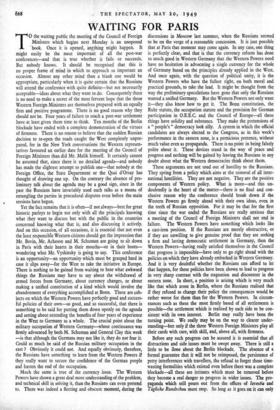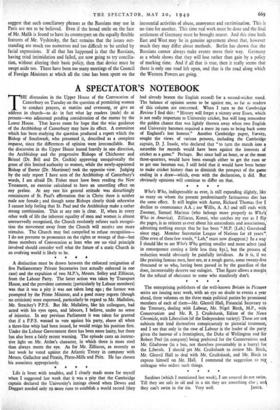WAITING FOR PARIS
T. the waiting public the meeting of the Council of Foreign Ministers which begins next Monday is an unopened ' book. Once it is opened, anything might happen. It might easily be the most important of all the post-war conferences—and that is true whether it fails or succeeds. But nobody knows. It should be recognised that this is no proper frame of mind in which to approach so important an occasion. Almost any other mind than a blank one would be appropriate, particularly when it is quite certain that the Russians will attend the conference with quite definite—but not necessarily acceptable—ideas about what they want to do. Consequently there is no need to make a secret of the most fervent hope that the three Western Foreign Ministers are themselves prepared with an equally firm and positive programme. There is no good reason why they should not be. Four years of failure to reach a post-war settlement have at least given them time to think. Ten months of the Berlin blockade have ended with a complete demonstration of the virtues of firmness. There is no reason to believe that the sudden Russian decision to re-open the roads caught the West completely unpre- pared, for in the New York conversations the Western represen- tatives favoured an earlier date for the meeting of the Council of Foreign Ministers than did Mr. Malik himself. It certainly cannot be assumed that, since there is no detailed agenda—and nobody has made the slightest attempt to publish one—that nobody at the Foreign Office, the State Department or the Quai d'Orsay has thought of drawing one up. On the contrary the absence of pre- liminary talk about the agenda may be a good sign, since in the past the Russians have invariably used such talks as a means of entangling the parties in procedural disputes even before the main • sessions have begun.
Yet the fact remains that it is often—if not always—best for great historic parleys to begin not only with all the principals knowing what they want to discuss but with the public in the countries concerned knowing what that is, and also discussing it actively. And on this occasion, of all occasions, it is essential that not even the least responsible Western citizens should get the impression that Mr. Bevin, Mr. Acheson and M. Schuman are going to sit down in Paris with their hearts in their mouths—or in their boots— wondering what Mr. Vyshinsky is going to say. This conference is an opportunity—an opportunity which must be grasped hard in case it slips away—for the West to take the initiative in Europe. There is nothing to be gained from waiting to hear what awkward things the Russians may have to say about the withdrawal of armed forces from Germany, about currency changes, or about making a unified constitution of a kind which would involve the abandonment of everything accomplished at Bonn. These are sub- jects on which the Western Powers have perfectly good and success- ful policies of their own—so good, and so successful, that there is something to be said for putting them down openly on the agenda and setting about extending the benefits of four years of experience in the West to Germany as a whole. The crucial point about the military occupation of Western Germany—whose continuance was firmly advocated by both M. Schuman and General Clay this week —is that although the Germans may not like it, they do not fear it. Could as much be said of the Russian military occupation in the east ? Obviously it could not. And equally obviously, therefore, the Russians have something to learn from the Western Powers if they really want to secure the confidence of the German people and hasten the end of the occupation.
Much the same is true of the currency issue. The Western Powers have shown a great deal more understanding of the problem, and technical skill in solving it, than the Russians can even pretend to. There was indeed a fleeting and obscure moment, during the discussions in Moscow last summer, when the Russians seemed to be on the verge of a reasonable concession. It is just possible that at Paris that moment may come again. In any case, one thing is perfectly clear, and that is that the currency reform has done so much good in Western Germany that the Western Powers need have no hesitation in advocating a single currency for the whole of Germany based on the principles already applied in the West. And once again, with the question of political unity, it is the Western Powers who have the fullest right, on both moral and practical grounds, to take the lead. It might be thought from the way the preliminary speculations have gone that only the Russians wanted a unified Germany. But the Western Powers not only want it—they also know how to get it. The Bonn constitution, the Ruhr statute, the occupation statute and the provision for German participation in 0.E.E.C. and the Council of Europe—all these things have solidity and substance. They make the pretensions of a " people's " democracy look silly. A system in which the official candidates are always elected to the Congress, as in this week's performance in the eastern zone, is a pernicious pretence, without much value even as propaganda. There is no point in being falsely polite about it. These devices stand in the way of peace and progress and nothing will be gained by leaving the Russians in any doubt about what the Western democracies think about them.
These arguments are not used out of hostility to the Russians. They spring from a policy which aims at the removal of all inter- national, hostilities. They are not negative. They are the positive components of Western policy. What is more—and this un- doubtedly is the heart of the matter—there is no final and con- clusive reason why the conference should break down if the Western Powers go firmly ahead with their own ideas, even in the teeth of Russian opposition. For it may be that for the first time since the war ended the Russians are really anxious that a meeting of the Council of Foreign Ministers shall not end in failure. The Western Powers have something which looks like a cast-iron position. If the Russians are merely obstructive, or if they are unwilling to give genuine proof that they are seeking a firm and lasting democratic settlement in Germany, then the Western Powers—having really satisfied themselves in the Council that progress is impossible—have only to go right ahead with the policies on which they have already embarked in Western Germany. And it is very doubtful whether the Russians can afford to let that happen, for these policies have been shown to lead to progress in very sharp contrast with the stagnation and discontent in the eastern zone. In short, a position is arising which is very much like that which arose in Berlin, where the Russians realised that if they refused to change their policy the consequences would be rather worse for them than for the Western Powers. In circum- stances such as these the most firmly based of all settlements is possible—the settlement which is realised by each side to be con- sistent with its own interest. Berlin may really have been the turning point. We really may be on the way to clearer under- standing—but only if the three Western Foreign Ministers play all their cards with care, with skill, and, above all, with firmness.
Before any such progress can be assured it is essential that all distractions and side issues must be swept away. There is still a little to be flone about the Berlin blockade. The absence of a formal guarantee that it will not be reimposed, the persistence of petty interferences with travellers, the refusal to forget those time- wasting formalities which existed even before there was a complete blockade—ail these are irritants which must be removed before they become a real danger to progress in wider issues. The pro- paganda which still pours out from the offices of lavestia and Tagliche Rundschau must stop. So long as it goes on it can only suggest that such conciliatory phrases as the Russians may use in Paris are not to be believed. Even if the broad smile on the face of Mr. Malik is found to have its counterpart on the equally flexible features of Mr. Vyshinsky, the fact remains that the issues out-. standing are much too numerous and too difficult to be settled by facial expressions. If all that has happened is that the Russians, having tried intimidation and failed, are now going to try concilia- tion, without altering their basic policy, then that device must be swept aside too. There have been too many meetings of the Council of Foreign Ministers at which all the time has been spent on the inessential activities of abuse, annoyance and recrimination. This is no time for another. This time real work must be done and the final settlement of Germany must be brought nearer. And this time both East and West may be in genuine agreement about that, however much they may differ about methods. Berlin has shown that the Russians cannot always make events move their way. Germany as a whole shows that they will lose rather than gain by a policy of marking time. And if all that is true, then it really seems that there is only one road left open, and that is the road along which the Western Powers are going.











































 Previous page
Previous page